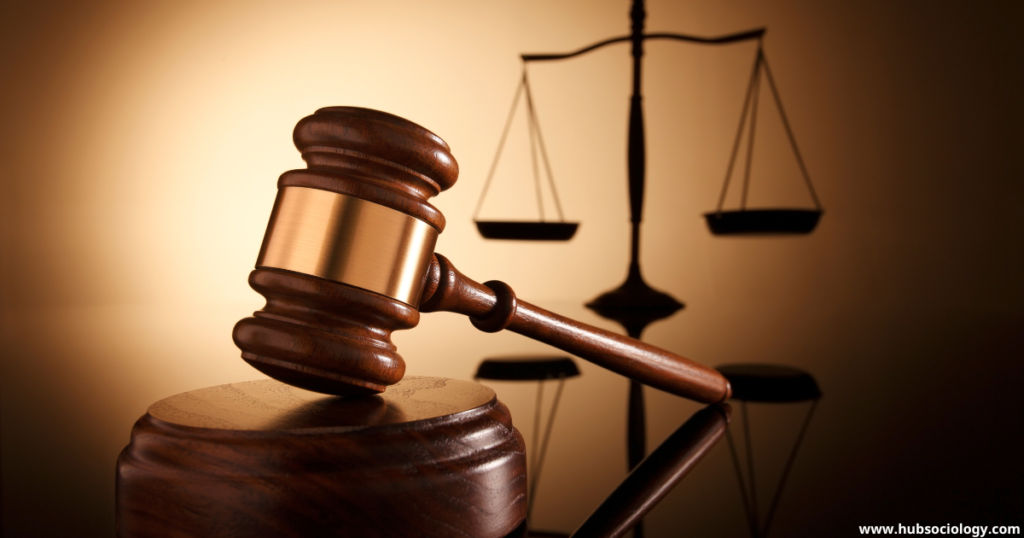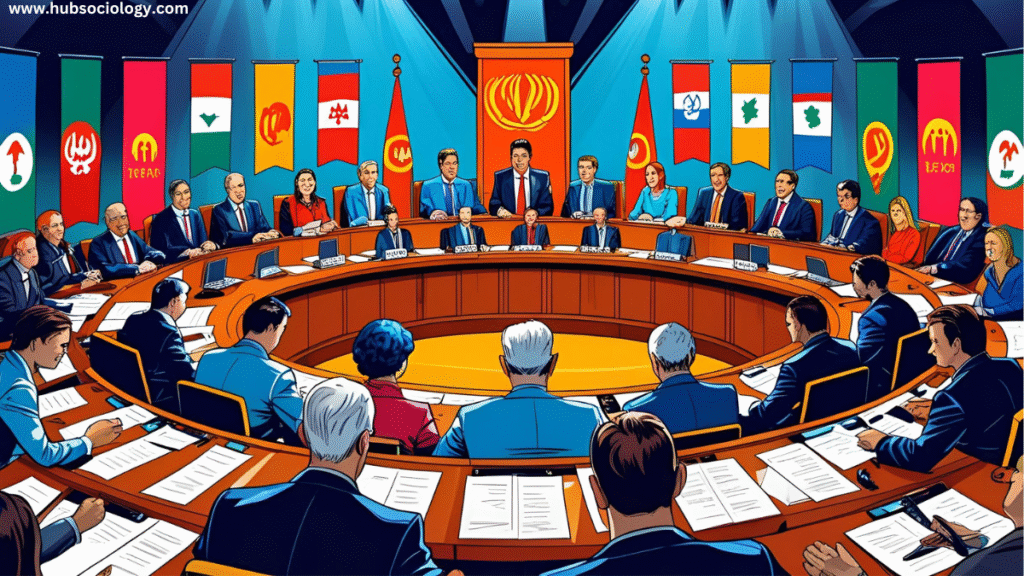Introduction on Concept of Power
Michel Foucault (1926–1984), a French philosopher and social theorist, revolutionized the understanding of power in sociology. Unlike traditional theories that view power as a centralized, repressive force held by institutions or elites, Foucault conceptualized power as diffuse, relational, and productive. His ideas challenge conventional Marxist and Weberian perspectives, offering a more nuanced analysis of how power operates in modern societies. This article explores Foucault’s concept of power, its mechanisms (disciplinary power, biopower, and governmentality), and its sociological implications.

1. Foucault’s Rejection of Traditional Power Theories
Before Foucault, power was often understood in two dominant ways:
- Marxist view: Power is held by the ruling class and exercised through economic domination and ideological control.
- Weberian view: Power is the ability of individuals or groups to impose their will despite resistance, often institutionalized in bureaucracies.
Foucault rejected these views, arguing that power is not something one possesses but something that circulates through social relations. He shifted focus from “who has power” to “how power operates.” For Foucault, power is not merely repressive but also productive—it shapes knowledge, norms, and identities.
2. Power as Relational and Dispersed
Foucault’s key argument is that power is not centralized but operates through a network of relations. In Discipline and Punish (1975), he illustrates how power functions in institutions like prisons, schools, and hospitals. Rather than being imposed from above, power works through everyday practices, surveillance, and self-regulation.
Key Features of Foucault’s Power:
- Capillary: Power flows through the smallest social units, not just top-down.
- Productive: It produces knowledge, truths, and subjectivities (e.g., the “mad,” the “criminal”).
- Resistance: Where there is power, there is resistance—power and resistance coexist.
3. Mechanisms of Power in Foucault’s Work
Foucault identified several mechanisms through which power operates in modern societies:
A. Disciplinary Power
In Discipline and Punish, Foucault examines how modern institutions control individuals through surveillance and normalization. He introduces the Panopticon—a prison design by Jeremy Bentham where inmates self-regulate due to the possibility of being watched. This principle extends to schools, factories, and hospitals, where individuals internalize discipline.
- Techniques of Disciplinary Power:
- Hierarchical observation (constant surveillance)
- Normalizing judgment (defining what is “normal” and punishing deviations)
- Examination (assessing individuals to categorize and control them)
B. Biopower
In The History of Sexuality (1976), Foucault introduces biopower—the regulation of populations through biological and social controls. Unlike sovereign power (which decides life and death), biopower manages life through:
- Regulation of bodies (health, reproduction, sexuality)
- Population control (birth rates, mortality, public health policies)
Biopower is crucial in modern states, where governance extends to managing life itself (e.g., public health campaigns, eugenics).

C. Governmentality
Foucault later developed the concept of governmentality—how modern states govern not just through laws but by shaping behaviors, mentalities, and self-regulation. It combines:
- State institutions (laws, policies)
- Technologies of the self (how individuals govern themselves)
Governmentality explains why people conform without overt coercion—power operates through education, media, and self-discipline.
4. Power/Knowledge Nexus
Foucault famously stated, “Power produces knowledge” (Power/Knowledge, 1980). Truth is not absolute but constructed through power relations. Institutions (universities, hospitals, courts) determine what counts as legitimate knowledge, marginalizing alternative perspectives.
Examples:
- Medical power: Doctors define “normal” vs. “abnormal” health.
- Criminal justice: Legal systems produce “criminals” through categorization.
- Sexuality: Psychiatry historically pathologized homosexuality as a mental illness.
This nexus shows how power shapes reality by controlling discourse—what can be spoken, by whom, and with what authority.
5. Sociological Implications of Foucault’s Concept of Power
Foucault’s ideas have profound implications for sociology:
A. Critique of Institutions
His work reveals how institutions (prisons, schools, asylums) are not neutral but enforce norms. For example:
- Education system: Standardized testing normalizes certain knowledge while excluding others.
- Mental health institutions: Define “sanity,” often marginalizing dissenters.
B. Subjectivation: The Creation of Docile Bodies
Individuals are not just oppressed but shaped by power into docile bodies—self-regulating, obedient subjects. Socialization processes (schooling, media) teach people to police themselves.
C. Resistance and Counter-Discourses
Foucault’s power is not deterministic; resistance is always possible. Social movements (feminism, LGBTQ+ rights) challenge dominant discourses, reclaiming marginalized identities.
D. Surveillance Society
Foucault’s Panopticon foreshadowed modern surveillance (CCTV, social media monitoring). People modify behavior due to perceived observation—a key issue in digital sociology.
6. Criticisms of Foucault’s Concept of Power
Despite its influence, Foucault’s theory faces critiques:
- Lack of agency: Some argue his theory leaves little room for individual resistance.
- Overemphasis on discourse: Critics say he neglects material economic forces (Marxist critique).
- Pessimism: His view of power seems inescapable, offering no clear path to liberation.
Yet, his work remains foundational in understanding modern governance, identity formation, and social control.
Conclusion on Concept of Power
Foucault’s concept of power transforms sociological analysis by showing how power operates beyond coercion—through knowledge, discipline, and self-regulation. His insights into disciplinary power, biopolitics, and governmentality reveal the subtle ways modern societies control individuals. While critics question his neglect of agency and economic structures, his work remains essential for analyzing institutions, resistance, and the construction of truth. Foucault’s legacy endures in critical theory, gender studies, criminology, and beyond, proving that power is not just something we fight against but something we live within.

Highly Recommended Books
- Contemporary Sociology by M. Francis Abraham – Amazon Link – https://amzn.to/43UmbxL
- Fundamentals of Sociology by P. Gisbert
- Sociology A Guide to Problems and Literature by T.B. Bottomore – Amazon Link – https://amzn.to/4jwPFqZ
Topic Related Questions on Concept of Power
5-Mark Questions on Concept of Power (Short Answer)
- Define Foucault’s concept of power in one sentence.
- What is the difference between sovereign power and disciplinary power according to Foucault?
- Explain the Panopticon in Foucault’s theory of power.
- How does Foucault view the relationship between power and knowledge?
- What is “biopower” in Foucault’s analysis?
- Give an example of how disciplinary power operates in schools.
- What does Foucault mean by “power is productive”?
- How does Foucault’s concept of power differ from Marxist theories?
- Name two institutions where Foucault’s disciplinary power is evident.
- What is “governmentality” in Foucault’s later works?
10-Mark Questions on Concept of Power (Brief Essay)
- Explain Foucault’s critique of traditional theories of power (Marxist and Weberian).
- Discuss how Foucault’s concept of power operates through surveillance and normalization.
- Analyze the role of discourse in Foucault’s power/knowledge nexus with an example.
- How does Foucault’s idea of “biopower” apply to modern public health policies?
- Compare and contrast sovereign power and disciplinary power in Foucault’s work.
- Explain how schools function as institutions of disciplinary power.
- What is “docile body” in Foucault’s theory, and how is it created?
- How does resistance function in Foucault’s framework of power?
- Discuss the concept of governmentality and its relevance in modern governance.
- How does Foucault’s theory explain the control of sexuality in society?
15-Mark Questions on Concept of Power (Long Essay/Application-Based)
- Critically examine Foucault’s concept of power as both repressive and productive. Provide sociological examples.
- “Power is everywhere, not because it embraces everything, but because it comes from everywhere.” Discuss this statement in the context of Foucault’s theory.
- Analyze how Foucault’s disciplinary power operates in prisons and hospitals. What are its implications for social control?
- Evaluate the strengths and weaknesses of Foucault’s theory of power in understanding modern institutions.
- How does Foucault’s idea of biopower explain state control over populations during crises (e.g., COVID-19 pandemic)?
- Discuss Foucault’s argument that power produces knowledge. How does this challenge traditional notions of truth?
- Apply Foucault’s concept of governmentality to analyze contemporary surveillance technologies (e.g., social media, AI monitoring).
- Compare Foucault’s and Gramsci’s theories of power. Which is more relevant in analyzing cultural hegemony today?
- “Resistance is inherent in power relations.” Discuss with reference to social movements (e.g., #MeToo, Black Lives Matter).
- How does Foucault’s theory help in understanding the medicalization of mental illness?
